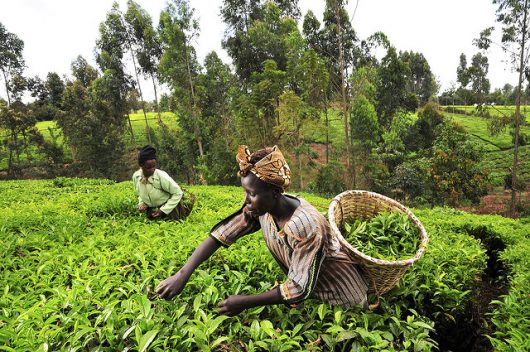Sustainable Agriculture in Kenya
 The first thing that may pop into people’s minds when they here “sustainable agriculture in Kenya” is coffee. This coffee may appear on the menu of a coffee shop or just sitting in a thermos in the back of the local gas station, labeled fair trade. Either way, it is probably the most the average person knows about sustainable agriculture in Kenya. Coffee is one of Kenya’s most important agricultural exports. Kenya boasts an average economic growth rate of around five percent a year over the last decade, and agriculture makes up 35 percent of the economy and employs up to 75 percent of the population with full-time and part-time jobs.
The first thing that may pop into people’s minds when they here “sustainable agriculture in Kenya” is coffee. This coffee may appear on the menu of a coffee shop or just sitting in a thermos in the back of the local gas station, labeled fair trade. Either way, it is probably the most the average person knows about sustainable agriculture in Kenya. Coffee is one of Kenya’s most important agricultural exports. Kenya boasts an average economic growth rate of around five percent a year over the last decade, and agriculture makes up 35 percent of the economy and employs up to 75 percent of the population with full-time and part-time jobs.
Development of farming techniques
Sustainable agriculture in Kenya is becoming more important as the world’s climate changes and the Kenyan government relies on a bountiful harvest for export. For the men and women working on the soil in Kenya, it is more than just an economic statistic. For them, it is a way to feed their families and themselves. As climate change wreaks havoc in eastern and southern Africa and what used to be modern farming techniques become outdated, the people have learned to adapt.
In order to combat changing rain patterns and decrease in rainfall, farmers in Kenya are learning how to adopt new farming techniques. Where once farmers mono-cropped (planted only one seed type or plant such as a cereal grain) now there is intercropping (the planting of multiple seeds and plant types such as cereal grain planted with legumes). This helps the farmers by increasing their crop output and provides insurance against the failure of one of the crops. In multiple small studies done by the International Maize and Wheat Improvement Center, the multi-cropping system introduced improved agricultural output and reduced the reliance on herbicides and fertilizers.
Threat to agriculture
A major threat to sustainable agriculture in Kenya is the overuse of industrial fertilizers, herbicides, and pesticides. Heavy use of these chemicals may increase crop yields in the short term but will decrease the soil quality over time. The low crop yields over time will not only hurt the Kenyan economy but also the people. Consequences of low crop yields are a lack of money to buy food or just the lack of food availability.
An NGO called ACE Africa is working on community livelihood programs to educate farmers and their families on the proper use of these chemicals. They are also teaching farmers the importance of crop rotation and mulching. Different types of crops use different nutrients from the soil. By planting one type in one field this year and a different one in the same field next year, nutrients will have time to naturally replenish. By mulching or placing plant matter over top of a field that was just planted, moisture is retained, so a farmer has to use less water. Also, nutrients from the dying plants seep into the soil, decreasing the need for fertilizers.
Tea production in Kenya
Coffee is not the only popular and important hot beverage export of Kenya. Tea is also a major agricultural product. Farming tea is labor intensive because it must mostly be done by hand. Damaging the tea leaves before they enter the factories can result in a lesser product. As tea farming and production is already labor intensive, the Rainforest Alliance has taken on the mission of teaching tea farmers sustainable techniques to help them increase their yields and lower their overhead cost, to give them alternative to artificial chemicals. This is a large mission since there are thousands of small tea farms in Kenya and an estimated 500,000 tea farmers and workers. It is not possible to teach every farmer directly. They have decided to take a different approach and let their actions and results speak for them. By showing the neighboring farms the good results of their sustainable farming techniques, hopefully, others will begin to transition as well and learn from their neighbors.
Next time the menu offers Kenyan coffee or maybe tea, try it. Know that the farmers on the other end of the trade route worked hard to get that product in your table. Also know that they are trying their best to be citizens of a better world for themselves, their country, and in the end for all of us.
– Nicholas Anthony DeMarco
Photo: Flickr
